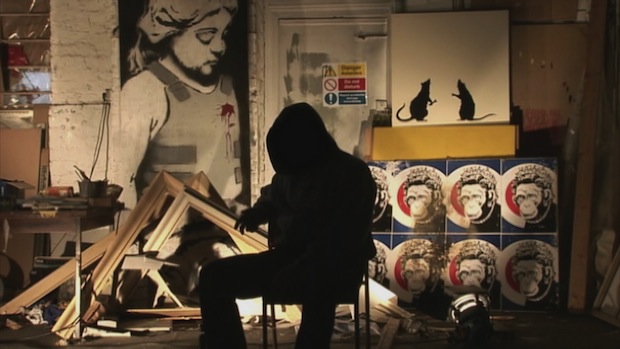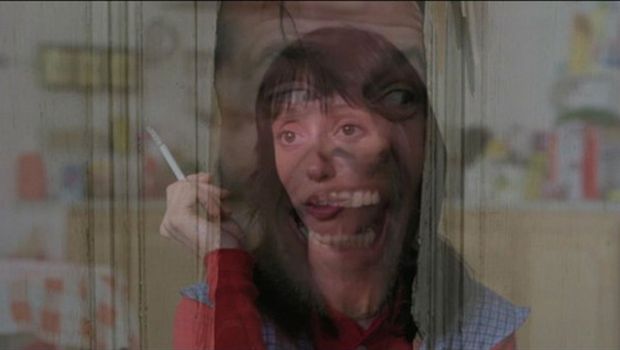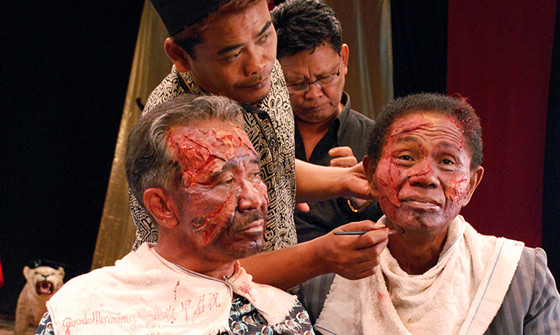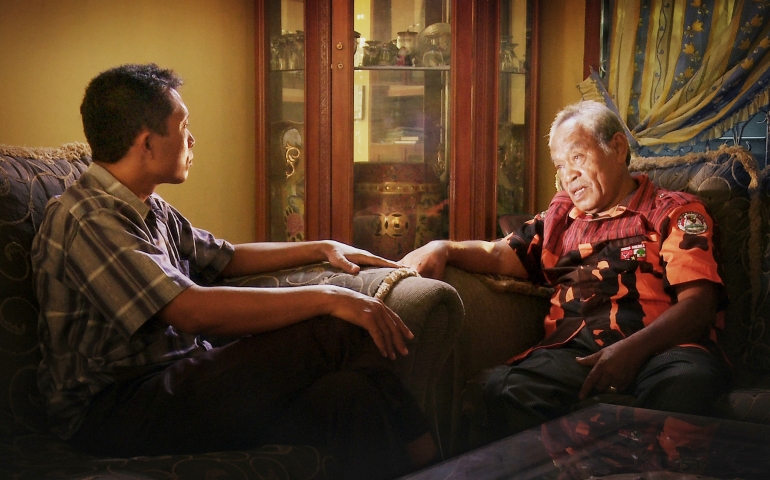6. Exit Through the Gift Shop (2010, Banksy)

Exit Through the Gift Shop is a film directed by the illusive English street artist, Banksy. It tells the story of Thierry Guetta, a street art enthusiast who, in typical postmodern style, obsessively films seemingly every waking moment of his life including interactions with Banksy and other street artists.
The film then follows Guetta as he puts on an art exhibition in Los Angeles showcasing his own work. The work he exhibits shows a flagrant disregard for authorship and identity by shamelessly copying other artists and styles that he has come across on his voyeuristic journey.
This can be considered a commentary on postmodernism and Guetta’s success a commentary on what it means to be successful in the postmodern world. Banksy doesn’t approve of Guetta’s success however and, in typical postmodern fashion, the audience is invited to make of his displeasure what they will.
Like Catfish, Exit Through the Gift Shop has been the subject of debate as to whether the film is genuine or not and, again, this changes little of what the film is trying to say.
7. Room 237 (2012, Rodney Ascher)

Stanley Kubrick’s masterpiece, The Shining is examined with a closeness that has never been afforded any film before in Rodney Ascher’s documentary called Room 237 after the notorious room in Kubrick’s film.
As well as being a truly therapeutic experience for hardened cinephiles desperate to know as much as possible about one of Hollywood’s greatest films, the documentary attempts to present the many different meanings an audience can find in the film.
Although for non-hardened cinephilles, the film’s attempt to find every possible meaning an audience could possibly have taken from the film in over 30 years can at times seem futile and tiresome.
However, when you consider that these differing meanings are more likely a result of audience interpretation rather than purposeful inclusion by Kubrick the film becomes a powerful examination of postmodern art.
In achieving this, the film also raises questions over what position auteurs like Kubrick now hold in the postmodern world as the meaning in a film lies not in its construction but in its interpretation by the viewer.
8. The Act of Killing (2012, Joshua Oppenheimer)

The Act of Killing is another film on the list that, although directed by Joshua Oppenheimer, has had Werner Herzog and Errol Morris’ involvement as both served as producers on the project. In the film, in typical postmodern fashion, the Cinema Theatre Gangsters, a group of men, all of whom are perpetrators of the Indonesian killings of 1965-66, are asked to re-enact their horrific crimes for the camera.
A criticism of the film is that it operates as nothing more than a snuff film, using the genocide of almost a million people for entertainment purposes and nothing more.
This is unfair as the exercise uncovers (among other things) the extent to which some of the perpetrators use the postmodern condition they live in today to detach themselves from the guilt associated with the atrocities they have committed in the past.
This is evident when Anwar, one of the Cinema Theatre Gangsters, does not describe their crimes as being more sadistic than the Nazis, but instead compares films about Nazis to films about themselves.
This is an example of Anwar privileging signs and signifiers that are composite within cinema more so than reality. Anwar’s portrayal as being consumed within the postmodern condition could be understood as Anwar’s way of attempting not to feel guilt in the same way another member, Adi, blames the government for not issuing an apology. This detaches Anwar from reality and in this way he can be seen as a fitting subject for a postmodern documentary.
9. Stories We Tell (2012, Sarah Polley)

Stories We Tell is a Canadian documentary directed by Sarah Polley that explores her own family’s intimate secrets through re-enactment and interviews with family members. One secret that is uncovered as the story progresses forces Polley to rethink her own identity. As stated before, identity being fluid and not a fixed concept is very much central to postmodernism.
The documentary is also extremely self-reflexive and introduces a meta-narrative in the form of the subject questioning the off-screen interviewer and asking what the film is really about.
As well as this, there are occasions in the film were the subjects of the film discuss objectivity, subjectivity and truth telling with the interviewer. The de-constructing of genres and narrative in this way is also central to postmodernism and although found most noticeably in Polley’s film, is something that can be found in most films on this list in some form.
10. The Look of Silence (2014, Joshua Oppenheimer)

The Look of Silence is another film directed by Joshua Oppenheimer and acts as a companion piece to The Act of Killing as it is also about the 1965-66 Indonesian killings.
Like the previous film by Oppenheimer it is also produced by Errol Morris and Werner Herzog. Made a few years after The Act of Killing and with different subjects, the film takes on the form of a more conventional documentary as it seeks to examine the causes of the genocide in more detail than the previous film allowed.
Despite this, the film is still very much an example of a postmodern documentary as Oppenheimer again takes a subjective position in the telling of the story. There are also many examples of themes apparent in the previous film such as a use of self-reflexivity and an ironic detachment from death.
Perhaps more moving and affecting than The Act of Killing, this is surely a future classic. Fans of The Act of Killing who haven’t got around to checking out The Look of Silence should definitely do so.
Author Bio: Richard Gallagher is from Ireland. He is a graduate of Queen’s University Belfast where he studied English and Film Studies and is currently studying for an MA in Conflict Transformation and Social Justice. Political cinema, film history and following the boys in green (the Irish football team) are among his many interests.